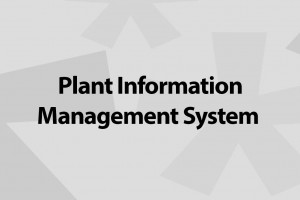Using a Plant Information Management System to Evaluate Data – Is it time to upgrade?
Nobody will deny the value of human judgment in assessing the validity of information, yet that judgment can be prone to any number of errors. In a manufacturing environment, adding a plant information management system can eliminate costly mistakes that stem from a mistaken assessment of whether an outlier data point is a harmless random variation in the regular data stream produced by the plant’s operations, or a real signal that something is amiss in those operations.
Consider a manufacturing plant that fills and packages liquids. During summer months, assume that a plant engineer sees a data signal indicating a high temperature reading at one point in the filling line. He may ignore that signal on an assumption that it is the result of hotter ambient temperatures. If, however, the signal is an indicator of a real problem, he may be allowing a number of containers to be filled to inaccurate levels if the high temperature affects fill-level measurements. Alternately, he can elect to shut down the fill line and investigate the problem. If that shut-down is an overreaction, the delay from stopping the line can cause production and order fulfillment issues. In either case, the engineer’s decision will be a function of his knowledge and experience with the line and will ultimately be based on intuition that may or may not serve him well.
Installing a plant information management system to the line or upgrading an existing system with an intelligent analytical system will improve the engineer’s ability to make the correct call.
 Initially, that new or upgraded system will give the engineer a plant-wide picture of everything happening in the plant, with data that is regularly averaged, filtered, time-stamped, and analyzed. In the fill line example, a plant information management system might see high temperature readings at multiple locations around a plant, and then compare those readings with ambient temperatures and conditions to arrive at a conclusion that the high readings are a result of total conditions. The system can also determine if a statistical correlation exists between fill levels and temperatures. The data that the system then gives to the engineer removes guesswork and intuition from his decisions.
Initially, that new or upgraded system will give the engineer a plant-wide picture of everything happening in the plant, with data that is regularly averaged, filtered, time-stamped, and analyzed. In the fill line example, a plant information management system might see high temperature readings at multiple locations around a plant, and then compare those readings with ambient temperatures and conditions to arrive at a conclusion that the high readings are a result of total conditions. The system can also determine if a statistical correlation exists between fill levels and temperatures. The data that the system then gives to the engineer removes guesswork and intuition from his decisions.
Plant information systems can also troubleshoot problems and suggest solutions in real-time, which will allow the engineer to keep production moving forward without any inordinate delays. A component in a fill line might begin to run hot after a certain number of hours of continuous operation, for example, which might suggest a maintenance operation on that component. Plant information systems can track data over a long time arc and derive these conclusions in real time without requiring the engineer to review data that had been produced over long periods of time to determine the cause of a problem.
This real-time component of plant information management systems is one of their greatest benefits for a plant engineer. Not only will it give the engineer a better opportunity to keep the plant at optimum capacity, but the real-time data from the plant’s operations can be interfaced with enterprise resource planning (ERP) systems to give production managers up-to-date information on plant output and availability of products.
A quality plant information management system will collect and archive data for smooth plant operations with effective troubleshooting, and it will generate and provide data in an easy to use and understand format at all levels of a plant’s operations.
Good Manufacturing Practices, Inc., (GMP) is a full-service control system engineering, system integrator, industrial controls, and automation solutions provider. Our consultants and engineers are experts in plant management system upgrades, installations and retrofits of new systems into existing plants, and training in getting the highest benefit from your plant information management system.
Experience the GMP difference. Contact GMP to discuss your automation needs and control system improvements.

